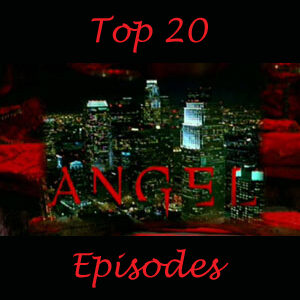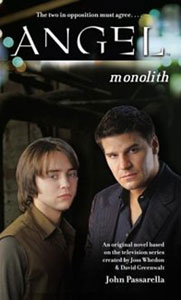John Passarella completes a solid three-for-three among Buffyverse novels with “Angel: Monolith” (June 2004). As with “Buffy: Ghoul Trouble” (2000) and “Angel: Avatar” (2001), this is a rock-solid effort with on-point characterization, accurate continuity, a decent sense of mystery and committed action writing. It doesn’t offer any plot surprises, which is why it doesn’t rise to the level of elite Buffyverse novels, but it’s completely respectable.
One of the few novels with a precisely defined position on the timeline – between “Spin the Bottle” (4.6) and “Apocalypse, Nowish” (4.7) – “Monolith” finds Gunn musing that “There ought to be a law. One apocalypse at a time” (page 94). The apocalypse in this book isn’t the one from Cordelia’s visions that will soon dominate Season 4, but Angel, Connor and Gunn certainly get put through their paces by an ancient sorcerer’s attempt to open a portal to a demon dimension.
Passarella starts by tapping into the mystery of a stone slab appearing out of nowhere that worked so well for the “2001: A Space Odyssey” series. In this case, it’s a monolith with a demon face on each side that pops up on a busy L.A. street. I’m reminded somewhat of “Independence Day,” too, as people gather around the slab, waiting for interdimensional visitors.
Angel and Connor are on the book’s cover, and it’s not false advertising: Their contentious father-son relationship is central to the novel, and they’ll need to work together to save the world. The author is good at describing Season 4’s relationship situations — not only Angel and Connor, but also how Wesley feels about the Gunn-and-Fred romance. He kind of hopes their relationship will fall apart, yet also wants Fred to be happy, and it’s not like he wishes ill will on Gunn either. There’s nothing surprising here, and there can’t be if the author is playing fair, but just having the situation be accurately described is refreshing after the misfire of the previous book, “Dark Mirror.”
Also, there’s something about this medium that makes an irritating TV character come off better, even if he’s behaving the exact same way. In this case, it’s Connor who is surprisingly palatable. Passarella is one of the elite action-scene writers among Buffyverse authors, and we get a boffo scene of Connor running dozens of city blocks, switching between rooftops and streets, in pursuit of a demon. When he speaks, he makes jabs at Angel here and there, but he’s not bratty.
Passarella also does a solid job with a gory opening sequence of a demon ritual, and he makes the world seem bigger with one demon fight outside the main narrative. (He similarly uses the unusual conceit of two distinct narratives in “Ghoul Trouble.”) Because of these details, “Monolith” has some heft to it.
For some readers, the action sequences will be too long-winded. I enjoyed the inertia of Connor chasing the demon, but the grand finale of our heroes fighting demons in another dimension becomes exhausting. “Monolith” also undercuts its mystery by placing the reader a step ahead of Angel Investigations’ research efforts, as we are privy to the villain’s schemes while Cordy, Wes, Fred and Lorne try to catch up to us. In the end, Passarella delivers a workmanlike page-turner, but as far as Season 4 apocalypses go, we know the bigger one is yet to come.

Click here for an index of all of John’s “Buffy” and “Angel” reviews.

